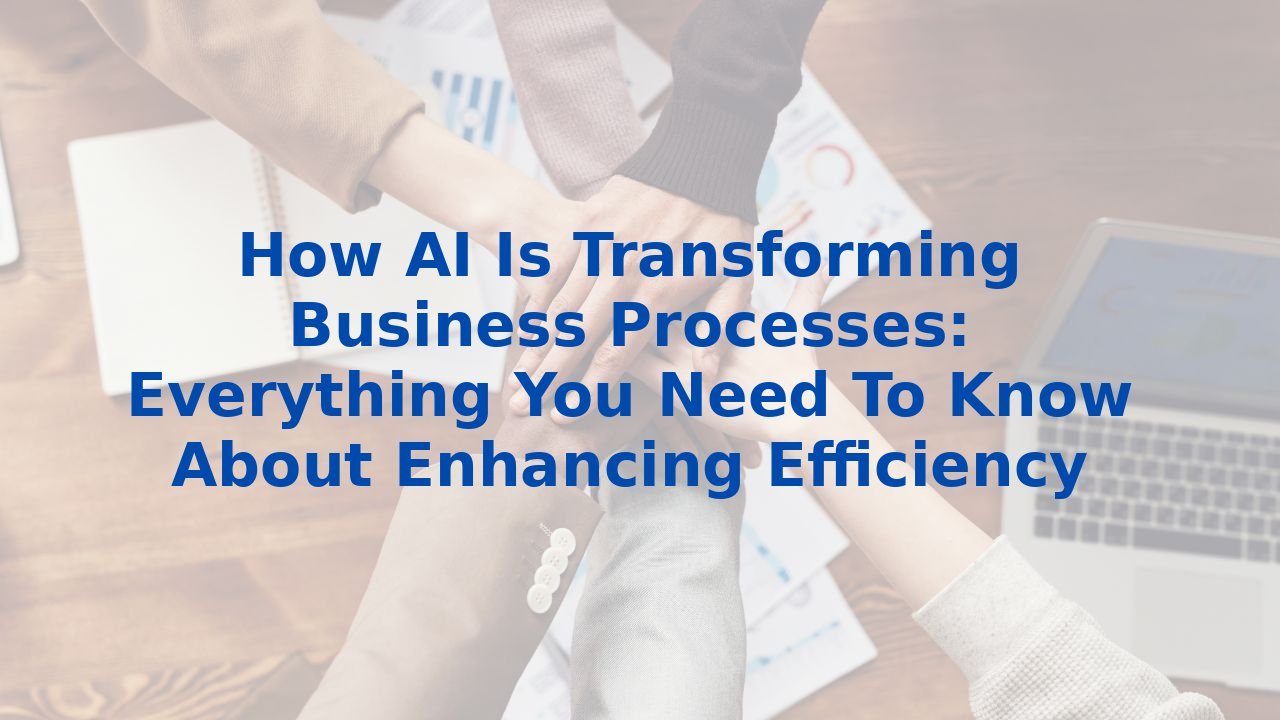How AI Is Transforming Business Processes: Everything You Need To Know About Enhancing Efficiency
How AI Is Transforming Business Processes: Everything You Need To Know About Enhancing Efficiency
In an era defined by rapid technological advancements, businesses face the ongoing challenge of enhancing efficiency and maintaining a competitive edge. The integration of Artificial Intelligence (AI) into essential business processes is not just a trend; it is a transformative movement that redefines how organizations operate. In this post, we will explore the pivotal role AI plays in optimizing business processes while emphasizing the significance of employee training in maximizing its benefits.
Understanding Business Process Management
Business Process Management (BPM) is the systematic approach to managing and improving an organization’s workflows and processes. Historically, BPM relied heavily on manual efforts, with teams creating maps, analyzing data, and streamlining operations through labor-intensive methods. These traditional approaches, while valuable, often led to delays and inconsistencies.
AI's Role in Enhancing Business Processes
With AI at the forefront, BPM is undergoing a paradigm shift that enables deeper insights and increased efficiency. Here’s how AI elevates business processes:
1. Data Analysis and Insights
The ability to analyze vast datasets in real-time is where AI truly shines. By leveraging machine learning algorithms, AI uncovers trends, predicts outcomes, and identifies inefficiencies with unprecedented speed. This capability allows organizations to base their strategic decisions on hard data rather than intuition, promoting agility in today’s dynamic market environment.
2. Process Building and Automation
AI also excels at automating repetitive tasks, creating streamlined workflows based on predefined criteria. This automation frees up valuable human resources, allowing employees to focus on complex problem-solving and innovative thinking rather than mundane tasks.
3. Process Discovery and Mapping
Through advanced techniques such as process mining and pattern recognition, AI can reveal existing workflows within an organization. By identifying bottlenecks and inefficiencies that might escape human notice, AI lays the groundwork for targeted improvements. It can automatically map processes and flag areas ripe for enhancement, paving the way for a more streamlined operation.
4. Real-Time Monitoring and Optimization
The real-time capabilities of AI empower organizations to monitor their processes continuously. This means anomalies can be detected immediately, enabling quick interventions when normal operations are disrupted. This proactive approach mitigates risks ensuring a smoother and more efficient workflow.
5. Enhancing Customer Interactions
AI technologies such as chatbots and virtual assistants fundamentally transform customer interactions. By utilizing Natural Language Processing (NLP), organizations can analyze customer feedback and social media sentiments, extracting actionable insights that drive improvements in service delivery and customer satisfaction.
Benefits of AI in Business Processes
The infusion of AI into BPM offers an impressive array of benefits:
- Improved Efficiency: Automation of repetitive tasks enables teams to engage in more strategic activities, driving productivity to new heights.
- Enhanced Decision Making: Data-driven insights facilitate better decisions, cutting down analysis time significantly.
- Increased Accuracy: With AI's precision, the margin for error shrinks, ensuring consistency in executing processes.
- Cost Reduction: Streamlined operations and optimized processes lead to lower operational costs, offering organizations a robust competitive edge.
- Enhanced Customer Experience: By delivering smarter solutions, organizations can improve customer interactions, fostering loyalty and satisfaction.
The Role of Employee Training in AI Integration
While the technological prowess of AI can reshape processes, the human component remains paramount. Training employees in AI's capabilities is essential for maximizing its potential. Consider the following advantages of comprehensive employee training:
- Understanding AI Capabilities: Employees need to grasp AI functionalities to integrate them into their workflows seamlessly.
- Adapting to New Tools: Effective training ensures a smooth transition to new systems and tools, minimizing disruptions.
- Optimizing AI Output: Trained teams can enhance AI’s effectiveness by providing quality data inputs and refining its parameters.
- Addressing Ethical Concerns: Through training, employees can navigate the moral landscape of AI, using it responsibly and ethically.
Conclusion
AI's integration into business process management heralds a new era of efficiency and agility. By utilizing AI's strengths in data analysis, automation, and customer engagement, organizations are positioned to thrive in an increasingly competitive landscape. Moreover, by investing in employee training, businesses not only ensure successful AI adoption but also cultivate a culture of continuous improvement and innovation. The future of business processes is bright, and embracing AI is the catalyst that will drive organizations forward.
For more insights and training solutions on how to equip your workforce with AI skills, visit Complete AI Training.



